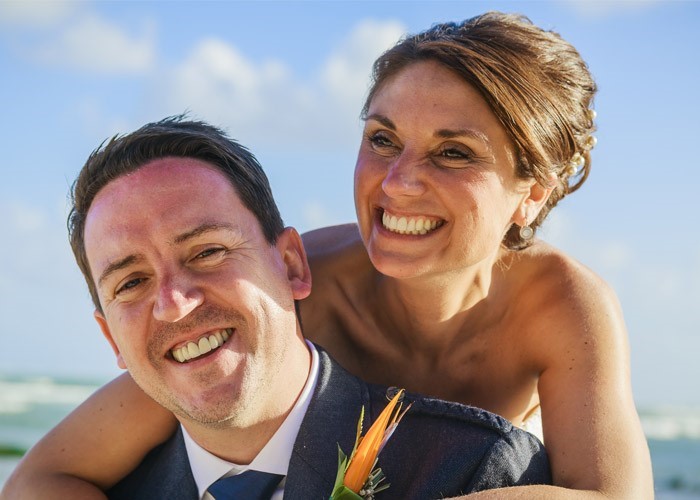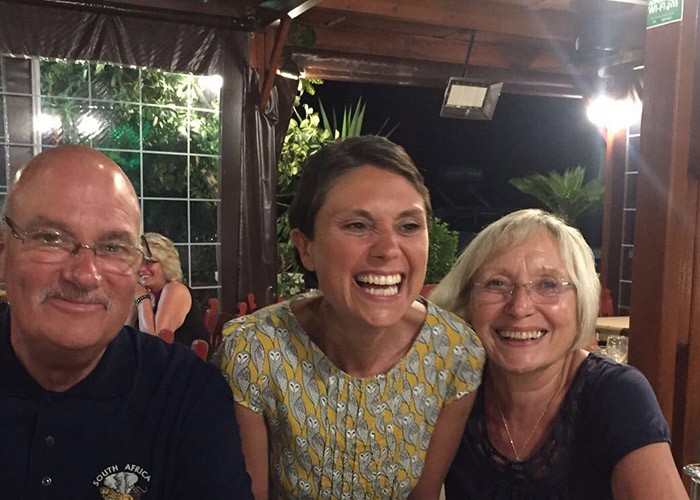Jo, who was diagnosed with secondary breast cancer aged 40, talks about the need for specialist care.
Jo, who was diagnosed with secondary breast cancer aged 40, talks about the need for specialist care and finding support from other women in her position.

I felt I’d lost my future with those I love
I am 42 years young. I am a wife, a step-mother, a dog-mother to Murphy my cocker spaniel, a daughter, a sister, an auntie and a friend. Until my diagnosis of secondary breast cancer in 2016, I was a social worker in the area of child protection.
I was diagnosed with primary breast cancer at the age of 30. But after 10 years of clear mammograms, I was diagnosed with incurable, metastatic, stage 4, secondary breast cancer in my liver and bones.
My whole life, and the lives of those around me, fell apart and changed forever. Following my diagnosis, in the space of a 20-minute consultation, I felt I lost my identity and my future with those I love.
No one had ever talked to me about secondary breast cancer or the signs and symptoms. I wasn’t even aware breast cancer could spread to other areas without ever returning to my breast, but it can metastasise to the bones, liver, lungs, skin or brain.
How can you be told you have a life-limiting illness and have no support?
Support following my diagnosis was non-existent. There were no specialist or secondary breast care nurses. I was told by a GP on a Friday evening, and sent home with my husband with a lack of knowledge and lack of a plan.
I no longer had support from the nurses at the breast care unit either, as their focus was on primary breast cancer. Following my primary diagnosis I had someone to contact for advice and support whenever I needed, but when diagnosed with secondary breast cancer there was nothing.
I was left completely in the dark, frightened, isolated and devastated. I thought at the time it would be better if I had died in an accident and known nothing about it. How can you be told you have a life-limiting illness and have no support?
I never want anyone to feel the isolation I felt following diagnosis. The sad thing is that I know this is still continuing.

I don’t feel like a ‘patient’ anymore
I joined the Campaigns Network to campaign for better care for women like me with secondary breast cancer.
Being involved in the campaign has given me a sense of purpose. It provides me with an element of control in terms of using my experiences to support others and advocate for change for those of us living with secondary breast cancer.
I don’t feel like a ‘victim’ or a ‘patient’. I feel like me again.
In a life-changing situation that almost broke me, I have been given an opportunity to make changes that benefit others.
I’ve been able to speak on the radio and television about my experiences and raise awareness of secondary breast cancer. I have spoken about the lack of adequate specialist nursing support, the lack of adequate data, and have attended events as a patient advocate. I have recently become a member of the Breast Cancer Clinical Expert Group – Patient Advisory Group and I am hoping to become a member of the secondary breast cancer panel. There’s a huge gap in data and data collection that is preventing significant research and progress in terms of treatments and specialist support, which needs to be addressed.
The most important thing to me is to raise awareness of secondary breast cancer so that people are aware of the signs and symptoms of the illness and are able to access treatments as soon as possible.
I had to change hospital to find support
Following a change of hospital, I now have support from my specialist breast care nurse.
I continue to have support through the friendships I have made from the Breast Cancer Care event for younger women with secondary breast cancer in Manchester. Very sadly, one of my best friends, Caroline, has recently been diagnosed with secondaries too – we both support each other.
I believe that every person needs to have access to a specialist nurse from the point of diagnosis, and given the opportunity to speak to someone with secondary breast cancer. I cannot emphasis enough how both of these things have helped to support me emotionally as well as physically.
Without both, those diagnosed will continue to feel isolated, unimportant, marginalised and ‘written off’.
Support Jo and join our Secondary. Not Second Rate. campaign.